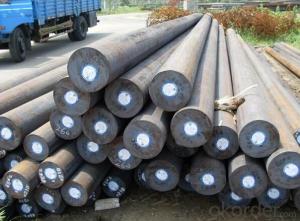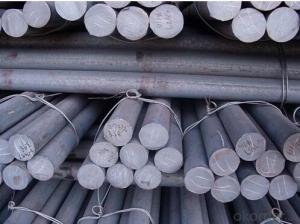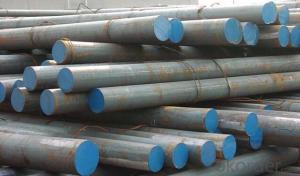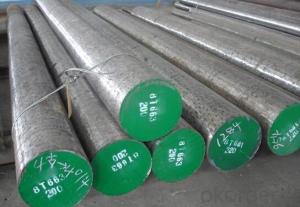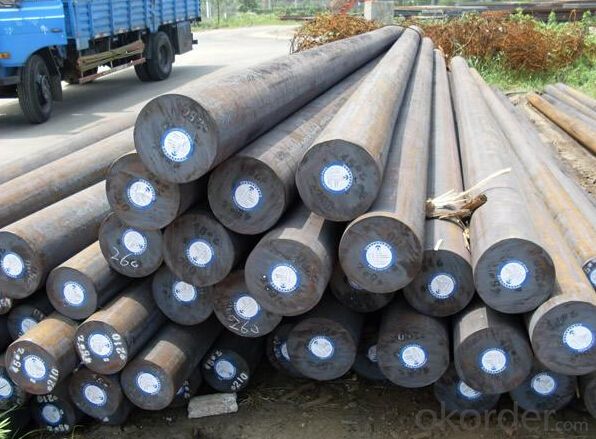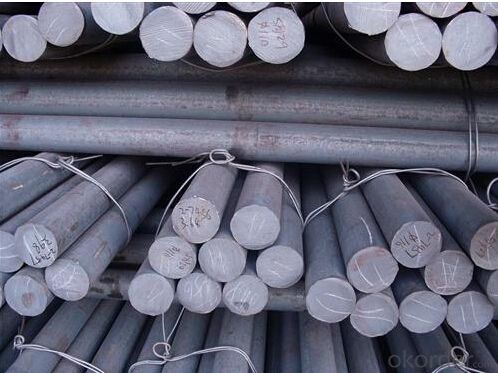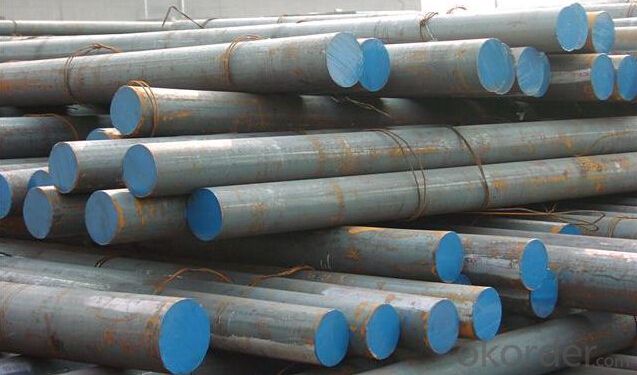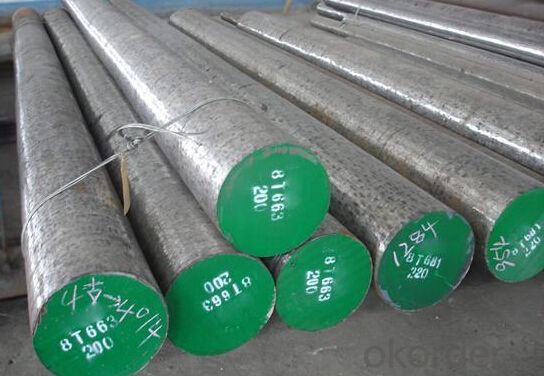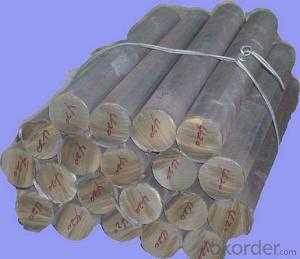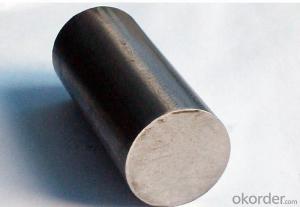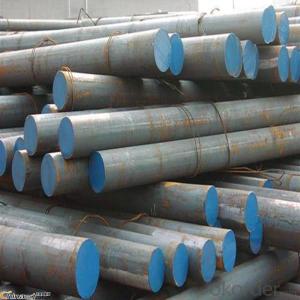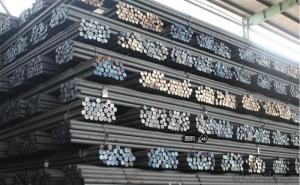Grade 4340 (ASTM A29/A29M) Alloy Steel Round Bar
- Loading Port:
- Shanghai
- Payment Terms:
- TT OR LC
- Min Order Qty:
- 3 m.t
- Supply Capability:
- 10000 m.t/month
OKorder Service Pledge
OKorder Financial Service
You Might Also Like
Specification
Specifications of Round Bar
1. Alloy steel round bar
2. Dia:16mm~250mm
3. Length: 6m, 9m, 12m or as customer’s request
4. Tolerance: Within ±5% for weight; ±2mm for diameter
5. Note: The price can be better is the quantity is good
Equivement Grade
DIN:34CRNIMO
SAE:4340
JIS:SNCM439(SNCM8)
BS:817M40
UNI:40NiCrMo7
Chemical Composition
| C | Si | Mn | S | P | Cr | Ni | Cu | Mo |
| 0.37-0.44 | 0.17-0.37 | 0.50-0.80 | ≤0.025 | ≤0.025 | 0.60-0.90 | 1.25-1.65 | ≤0.025 | 0.15-0.25 |
Our Featured Products
Alloy steel: Combination of steel / Bearing steel// Spring steel/ Cr- mo steel
GB 20Cr/ 40Cr / 42CrMo / 35CrMo/ 20CrMn/GCr15/30CrMnTi…
ASTM 5120 /5140 / 4140/ 4135/ 5152/52100…
JIS SCr420H/ SCr440/ SCM3/ SUP9/SUJ2…
Carbon steel: Carbon tool steel /Carbon Structural Steel
GB 20/ 35 /45/…
ASTM 1020/ 1030/1045…
JIS S20C/ S30C / S45C…
Usage and Applications of Round Bar
1. Chinese standard steel bar is often used where large amounts of steel need to be formed, for example as structural steel.
2. And we can use this kind of product on the performance of the mechanical parts if the demand is not very high.
3. Steel round bar is used in construction and a large number of architectural and engineering structures.
Packaging & Delivery of Round Bar
Packaging Detail: All goods are packed in bundle with steel strips and shipped by break bulk vessel or container (depend on target market and different ports)
Delivery Detail: 15~45 days
Trade terms: FOB, CFR, CIF
MOQ: 30 metric tons per specification; we can negotiate the quantity if the specification is normal or we have stock of one specification.
Weight: Theprice invoicing on theoretical weight basis or actual weight basis depends on customer’s request.
Shipment: The shipment of bulk break or container is depends on customer’s request and the situation of the port of destination.
Documents given: Full set of original clean on board bill of lading; Original signed commercial invoice; Original packing list; Policy of insurance; Certificate of origin and what the target market needs.
Production Flow of Round Bar
1. The common processes are preheated forging quenching, dual refinement solution process, cooling quenching and isothermal quenching. We use heat treatment for dual refinement solution process.
2. Material prepare (billet) — heat up — rough rolling — precision rolling — cooling — packing — storage and transportation
FAQ:
Q1: Why buy Materials & Equipment from OKorder.com?
A1: All products offered byOKorder.com are carefully selected from China's most reliable manufacturing enterprises. Through its ISO certifications, OKorder.com adheres to the highest standards and a commitment to supply chain safety and customer satisfaction.
Q2: How do we guarantee the quality of our products?
A2: We have established an advanced quality management system which conducts strict quality tests at every step, from raw materials to the final product. At the same time, we provide extensive follow-up service assurances as required.
Q3: How soon can we receive the product after purchase?
A3: Within three days of placing an order, we will begin production. The specific shipping date is dependent upon international and government factors, but is typically 7 to 10 workdays.
Q4: What makes stainless steel stainless?
A4: Stainless steel must contain at least 10.5 % chromium. It is this element that reacts with the oxygen in the air to form a complex chrome-oxide surface layer that is invisible but strong enough to prevent further oxygen from "staining" (rusting) the surface. Higher levels of chromium and the addition of other alloying elements such as nickel and molybdenum enhance this surface layer and improve the corrosion resistance of the stainless material.
Q5: Can stainless steel rust?
A5: Stainless does not "rust" as you think of regular steel rusting with a red oxide on the surface that flakes off. If you see red rust it is probably due to some iron particles that have contaminated the surface of the stainless steel and it is these iron particles that are rusting. Look at the source of the rusting and see if you can remove it from the surface.
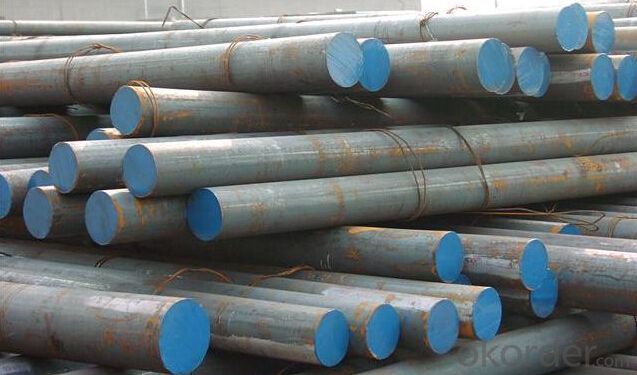
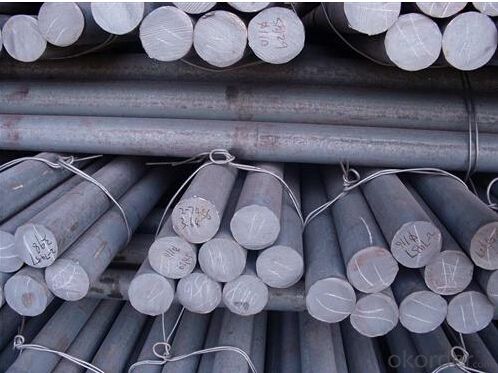
- Q: What are the different methods of testing special steel for quality assurance?
- There are several methods commonly used for testing special steel to ensure quality assurance. These methods include: 1. Chemical Analysis: This involves determining the composition of the steel by analyzing its chemical elements and their respective quantities. This helps to ensure that the steel meets the specified requirements and is free from any impurities. 2. Mechanical Testing: Mechanical testing assesses the strength, hardness, and other mechanical properties of the steel. Tensile tests, hardness tests, impact tests, and fatigue tests are some of the common mechanical tests performed on special steel. These tests help to evaluate the steel's performance under different conditions and ensure it meets the required standards. 3. Non-Destructive Testing (NDT): NDT techniques are used to detect any surface or internal defects in the steel without causing any damage. Magnetic particle testing, ultrasonic testing, radiographic testing, and dye penetrant testing are commonly employed methods for NDT. These tests are crucial in identifying any flaws that may compromise the steel's structural integrity. 4. Metallurgical Analysis: Metallurgical analysis involves the microscopic examination of the steel's microstructure to assess its quality. This analysis helps to identify any grain size variations, inclusions, or phase transformations that might affect the steel's performance. Metallography, optical microscopy, and electron microscopy are commonly used techniques for metallurgical analysis. 5. Corrosion Testing: Special steel is often exposed to harsh environments, making corrosion resistance a critical quality parameter. Corrosion testing evaluates the steel's resistance to corrosion in various conditions. Salt spray testing, electrochemical testing, and exposure to corrosive environments are some methods used for corrosion testing. 6. Dimensional Inspection: Dimensional inspection ensures that the special steel meets the specified dimensional requirements. This involves measuring the steel's dimensions, including length, width, thickness, and other critical dimensions, using calibrated instruments. By employing these various methods, manufacturers can thoroughly test special steel and ensure that it meets the required quality standards. This comprehensive testing helps to guarantee the performance, durability, and reliability of the steel in various applications.
- Q: What are the different classifications of special steel?
- Various types of steel alloys fall under the category of special steel, each possessing unique properties and characteristics that make them suitable for specific applications. Special steel can be classified into several categories: 1. Stainless Steel: This special steel contains a high percentage of chromium, which provides excellent corrosion resistance. It also typically includes elements like nickel and molybdenum, enhancing its strength and durability. Stainless steel finds common use in applications requiring resistance to oxidation, heat, chemicals, and wear, such as in food processing, medical devices, and construction. 2. Tool Steel: Specifically designed for manufacturing tools, dies, and molds, tool steel is known for its exceptional hardness, wear resistance, and toughness. Tool steel is further categorized into subcategories like high-speed steel (HSS), cold work steel, hot work steel, and plastic mold steel, each tailored for specific tooling applications. 3. Alloy Steel: This type of special steel contains additional alloying elements besides carbon. These elements, like manganese, silicon, nickel, chromium, and molybdenum, are added to enhance specific properties such as strength, toughness, hardenability, and corrosion resistance. Alloy steels are used in various applications, including automotive components, machinery, construction, and aerospace. 4. Spring Steel: Specifically designed to withstand repeated bending or twisting without permanent deformation, spring steel possesses excellent elasticity and fatigue resistance. It finds applications in springs, suspension systems, and high-performance automotive parts. 5. Bearing Steel: Bearing steel is engineered to provide high hardness, wear resistance, and dimensional stability necessary for manufacturing bearings. It typically contains high levels of carbon, chromium, and other alloying elements, ensuring the required mechanical properties for reliable and long-lasting bearings. 6. Electrical Steel: Also known as silicon steel, electrical steel is specifically designed for electrical applications. It possesses low electrical resistivity and high magnetic permeability, allowing efficient conduction and transformation of electrical energy. Electrical steel is commonly used in transformers, electric motors, and generators. These classifications of special steel emphasize the versatility and tailored properties of different steel alloys, enabling their application in a wide range of industries and specialized uses.
- Q: What are the different methods of preventing pitting corrosion in special steel?
- There are several methods to prevent pitting corrosion in special steel. One common approach is the use of corrosion-resistant alloys, such as stainless steel, which contain elements like chromium and nickel that form a protective oxide layer on the surface. Additionally, applying coatings or paints can provide a barrier against corrosive agents. Another effective method is cathodic protection, where a sacrificial anode or impressed current system is employed to protect the steel from corrosion. Regular inspection and maintenance, as well as controlling the environment by reducing exposure to corrosive substances, also play crucial roles in preventing pitting corrosion in special steel.
- Q: What are the properties of high-speed tool steel?
- High-speed tool steel possesses excellent hardness, wear resistance, and high hot hardness, allowing it to withstand high temperatures and maintain its sharpness even when subjected to intense heat during cutting or shaping processes. It also exhibits good toughness and the ability to retain its cutting edge, making it suitable for various machining applications. Additionally, high-speed tool steel has good machinability, enabling it to be easily shaped and formed into desired tool designs.
- Q: How does special steel perform in mining applications?
- Special steel performs exceptionally well in mining applications due to its unique properties and characteristics. It offers superior strength, hardness, and durability, making it highly resistant to wear, abrasion, and impact. This enables special steel to withstand the harsh and demanding conditions typically encountered in mining operations, including heavy loads, extreme temperatures, and corrosive environments. Additionally, its excellent machinability and weldability facilitate easy fabrication and repair of mining equipment, ensuring prolonged service life and efficient performance. Overall, special steel plays a crucial role in enhancing the productivity, safety, and reliability of mining operations.
- Q: Can special steel be used in the medical industry?
- Yes, special steel can be used in the medical industry. Special steel, specifically stainless steel, is commonly used in the manufacturing of medical devices and equipment due to its corrosion resistance, biocompatibility, and sterilization capabilities. It is used for surgical instruments, implants, prosthetics, and various other medical applications where durability, hygiene, and non-reactivity are essential.
- Q: What are the applications of special steel in the oil and gas supply chain?
- Special steel has various applications in the oil and gas supply chain. It is commonly used in the construction of pipelines, drilling equipment, and offshore platforms. Special steel's high strength, corrosion resistance, and ability to withstand extreme temperatures make it ideal for these applications. Additionally, special steel is used in the manufacturing of valves, fittings, and other components that are crucial for the efficient and safe operation of the oil and gas supply chain.
- Q: What are the main applications of special steel in the mining transportation?
- Special steel is widely used in mining transportation for various applications. One of the main applications is in the manufacturing of mining equipment such as drill bits, cutting tools, and conveyor belts. Special steel's superior strength, hardness, and resistance to wear and corrosion make it ideal for these components, ensuring their durability and longevity in harsh mining environments. Additionally, special steel is also used in the construction of mine shafts, tunnels, and bridges, where its high tensile strength and resistance to extreme temperatures are crucial. Overall, special steel plays a vital role in enhancing the performance, safety, and efficiency of mining transportation systems.
- Q: Can special steel be used in the defense industry?
- Yes, special steel can be used in the defense industry. Special steel, such as high-strength steel or armor-grade steel, possesses unique properties that make it suitable for various defense applications. It can be used for manufacturing military vehicles, aircraft components, body armor, ballistic plates, and other defense equipment that require enhanced strength, durability, and resistance to extreme conditions. Special steel's ability to withstand impacts, provide protection against projectiles, and maintain structural integrity makes it an essential material in the defense industry.
- Q: What are the main properties of special steel?
- The main properties of special steel include high strength, excellent corrosion resistance, superior heat resistance, good toughness, and exceptional wear resistance. Additionally, special steel often exhibits high ductility, machinability, and weldability, making it suitable for various applications in industries such as automotive, aerospace, and construction.
Send your message to us
Grade 4340 (ASTM A29/A29M) Alloy Steel Round Bar
- Loading Port:
- Shanghai
- Payment Terms:
- TT OR LC
- Min Order Qty:
- 3 m.t
- Supply Capability:
- 10000 m.t/month
OKorder Service Pledge
OKorder Financial Service
Similar products
Hot products
Hot Searches
Related keywords
